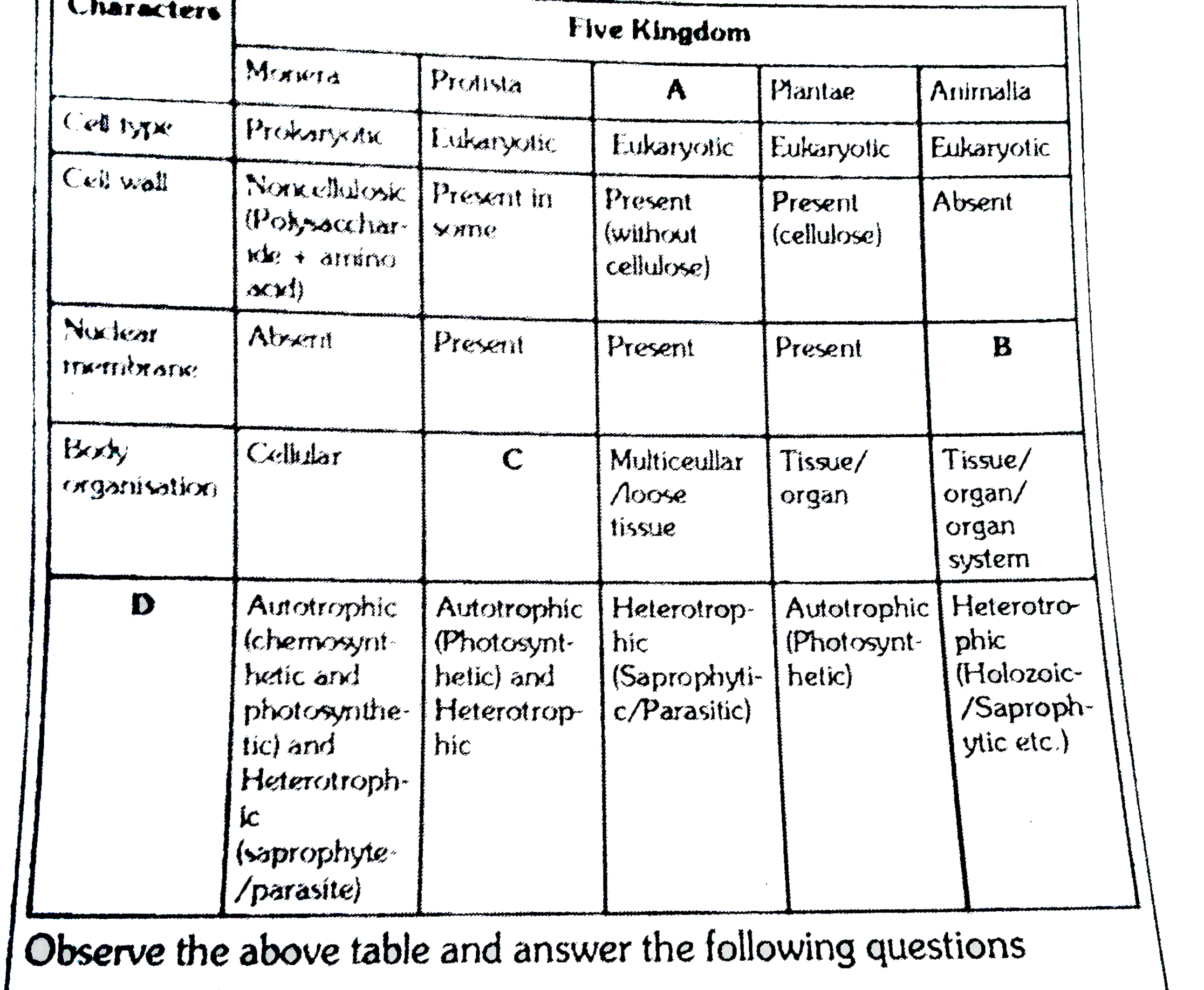Multicellular producers belong to kingdom
Protista
Protista and Plantae
Plantae
Plantae and Mycota
The correct Answer is:C
Step-by-Step Solution:
1. Understanding the Question: The question asks about the kingdom to which multicellular producers belong, according to the Whittaker classification system.
2. Whittaker's Classification: In 1969, Robert H. Whittaker proposed a classification system that divided living organisms into five kingdoms: Monera, Protista, Fungi, Plantae, and Animalia. This classification was based on three criteria: complexity of cell structure, complexity of the organism's body, and mode of nutrition.
3. Identifying Multicellular Producers:
- Producers are organisms that can make their own food through photosynthesis.
- Multicellular producers are typically green plants that have complex structures and are capable of photosynthesis.
4. Analyzing the Options:
- Option 1: Protista - This kingdom primarily consists of unicellular organisms. While some protists can perform photosynthesis (like algae), they are generally unicellular, so this option is incorrect for multicellular producers.
- Option 2: Protista and Plantae - This option is misleading because, as stated, Protista includes unicellular producers, while Plantae includes multicellular producers. Therefore, this option is also incorrect.
- Option 3: Plantae - This kingdom includes all green plants, which are multicellular and capable of photosynthesis. Thus, this option is correct.
- Option 4: Mycota - This term refers to fungi and is not recognized as a kingdom in Whittaker's classification, making this option incorrect.
5. Conclusion: Based on the analysis, the correct answer is that multicellular producers belong to the kingdom Plantae.
---
- Producers are organisms that can make their own food through photosynthesis.
- Multicellular producers are typically green plants that have complex structures and are capable of photosynthesis.
- Option 1: Protista - This kingdom primarily consists of unicellular organisms. While some protists can perform photosynthesis (like algae), they are generally unicellular, so this option is incorrect for multicellular producers.
- Option 2: Protista and Plantae - This option is misleading because, as stated, Protista includes unicellular producers, while Plantae includes multicellular producers. Therefore, this option is also incorrect.
- Option 3: Plantae - This kingdom includes all green plants, which are multicellular and capable of photosynthesis. Thus, this option is correct.
- Option 4: Mycota - This term refers to fungi and is not recognized as a kingdom in Whittaker's classification, making this option incorrect.
Topper's Solved these Questions
- BOOK - TRUEMEN BIOLOGY ENGLISHCHAPTER - BIODIVERSITT AND CONSERVATIONEXERCISE - MULTIPLE CHOICE QUESTIONS116videos
BIODIVERSITT AND CONSERVATION
- BOOK - TRUEMEN BIOLOGY ENGLISHCHAPTER - BIOTECHNOLOGY : PRINCIPLES AND PROCESSESEXERCISE - MULTIPLE CHOICE QUESTIONS124videos
BIOTECHNOLOGY : PRINCIPLES AND PROCESSES
Similar Questions
Knowledge Check
- Question 1 - Select One
The multicellular decomposers belong to kingdom
AmoneraBprotistaCfungiDplantae - Question 2 - Select One
Euglena belongs to kingdom
AmoneraBprotistaCplantaeDanimalia - Question 3 - Select One
Spirulina belongs to kingdom
AplantaeBmoneraCprotistaDfungi
Multicellular decomposers are
View SolutionMulticellularity is useful for
View Solution[A] : Unicellular organisms occur in 3 kingdoms .
[R] : Multicellular organisms also occur in 3 kingdoms .View Solution
Q. How many kingdoms include producers and name these kingdoms?View SolutionCyanobacteria belong to kingdom
View Solution

